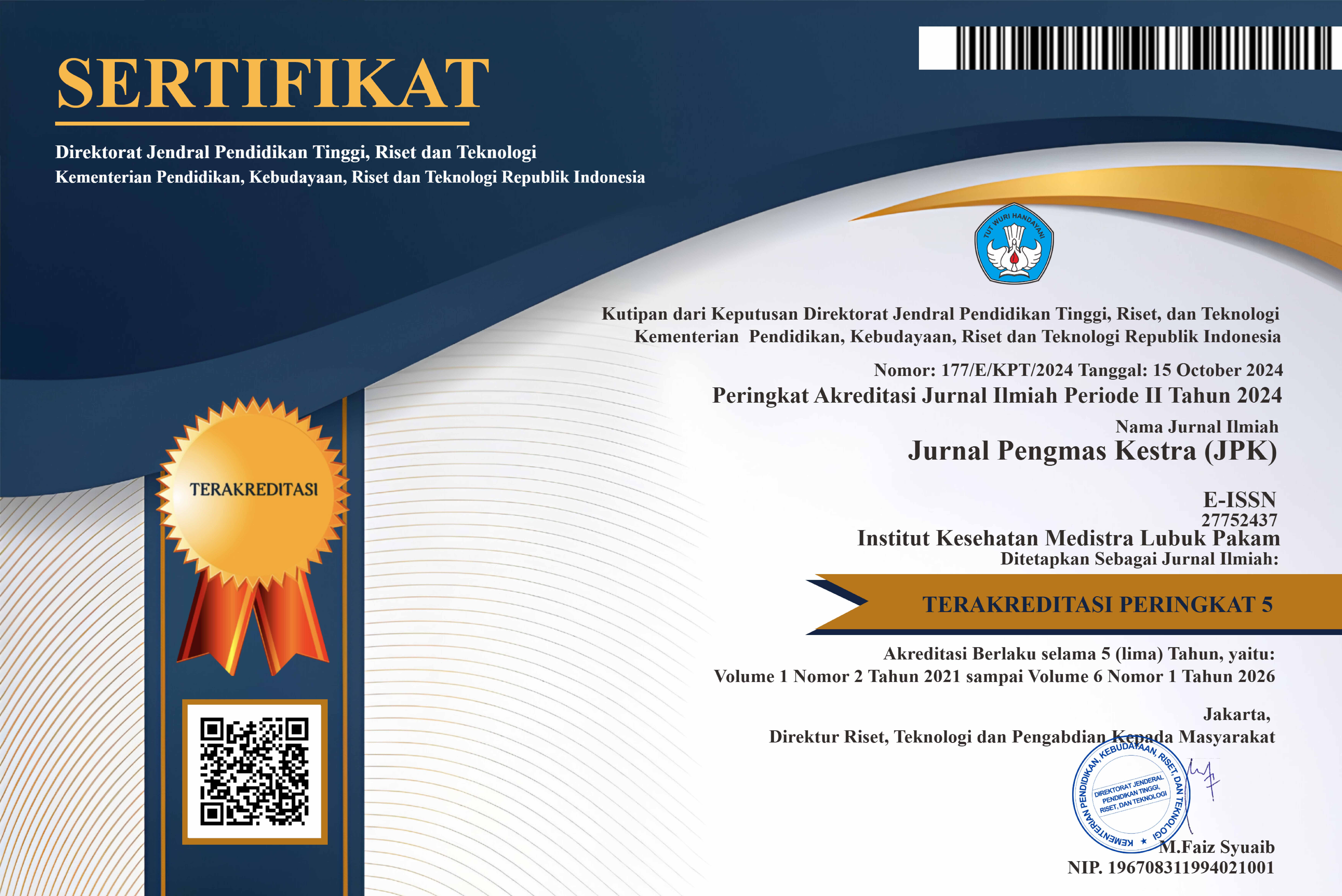The Effect of Pilates Exercise on Cognitive Function in The Elderly
DOI:
https://doi.org/10.35451/jpk.v4i1.2159Keywords:
Pilates Exercise, Cognitive Function, ElderlyAbstract
The number of elderly people worldwide is estimated to increase by 56% between 2015 and 2030. In Indonesia, the number of elderly people is estimated to increase by 23.66 million people, and is expected to continue to increase until 2035. Impaired cognitive function is one of the most common symptoms in the elderly. According to the World Health Organization (WHO), in 2017 there were 47 million people worldwide who experienced impaired cognitive function. Therefore, appropriate treatment is needed to improve the cognitive function of the elderly. Due to impaired cognitive function, a person becomes dependent on other people to care for themselves. To overcome this cognitive function disorder, it is necessary to carry out community service activities (PKM) in the form of outreach to the community about the importance of Pilates training for the elderly with the aim of overcoming cognitive function disorders in the elderly. Pilates exercise combines strength, flexibility and balance. Pilates exercise is a sport that focuses on lumbo-pelvic stabilization and activation of other body muscles. The methods applied in this activity are lectures, discussions and demonstrations of Pilates exercises and evaluation. Based on the results of the evaluation carried out, this socialization activity shows positive and satisfying benefits for the elderly where the elderly's understanding of Pilates exercises has improved. Previously they felt the exercises were very heavy and difficult to implement, but after doing them it turned out that these exercises were very interesting and easy to do. In fact, most of the elderly show a very high desire to continue to learn more and practice these exercises. Overall, this socialization activity received a positive response from the elderly, so it is hoped that it can encourage and motivate the elderly to independently carry out this exercise, considering that Pilates training is very useful in improving cognitive function. By increasing the understanding and interest of the elderly in this exercise, the elderly can develop this exercise on an ongoing basis, both individually and in groups, in order to maintain, develop and improve the cognitive function of the elderly so as to achieve the quality of society in general.
References
Abas?yan?k, Z., Ertekin, Ö., Kahraman, T., Yigit, P., & Özakba?, S. (2020). The effects of Clinical Pilates training on walking, balance, fall risk, respiratory, and cognitive functions in persons with multiple sclerosis: A randomized controlled trial. Explore, 16(1), 12–20.
Al Rasyid, I. S. (2017). Hubungan Faktor Risiko dengan Fungsi Kognitif pada Lanjut Usia Kecamatan Pandang Panjang Timur Kota Padang Panjang. Jurnal Kesehatan Andalas, 6(1), 49.
Anggraeni, R., Jati, R. P., Harlina, E., Wijaya, S. E. N., & Rima, U. (2020). Description of The Cognitive Level of Lansia at Further Age of Social Services. Jurnal Keperawatan, 12 (4), 567–572.
Fauziningtyas, R., Ulfiana, E., Haryanto, J., & Indarwati, R. (2017). Panduan Praktikum Keperawatan Gerontik (Vol. 53). Surabaya: Fakultas Keperawatan Universitas Airlangga.
García-Garro, P. A.-C.-A.-O.-G.-D.-A. (2020). Effectiveness of a pilates training program on cognitive and functional abilities in postmenopausal women. International Journal of Environmental Research and Public Health, 17(10).
Hanum, P., & Lubis, R. (2017). Hubungan Karakteristik dan Dukungan Keluarga Lansia Dengan Kejadian Stroke Pada Lansia Hipertensi di Rumah Sakit Umum Pusat Haji Adam Malik Medan. Jumantik, 3(1), 72-88.
Hutahuruk, R., Sembiring, N. E., & Sarma, A. (2021). Hubungan Aktivitas Fisik Dengan Fungsi Kognitif Pada Lansia di Desa Paran-Padang Kecamatan Sipirok Kabupaten Tapanuli Selatan. Jurnal Penelitian Keperawatan Medik, 3(1), 82-89.
I. Hadi, L. R. (2019). Mild Cognitive Impairment ( MCI ) pada Aspek Kognitif dan Tingkat Kemandirian Lansia dengan Mini-Mental State Examination ( MMSE ) Sebagai bagian dari penilaian Penuaan , diperkirakan prevalensi gangguan kognitif tanpa demensia sekitar 22 % dengan usia 71. Jurnal Penelitian, 48-58.
Kuswati, A., Sumedi, T., & Wahyudi. (2019). Elderly Empowerment Through The Activities Of Brain Function Cognitive Stimulation Elderly In Mersi Village District Banyumas. Journal of Bi Nursing, 1 (1), 1–9.
Maula, A., Laford, N., Orton, E., Iliffe, S., Audsley, S., Vedhara, K., et al. (2019). Use it or lose it: A qualitative study of the maintenance of physical activity in older adults. MBC Geriatrics, 19(1), 1-12.
Myrberg, K., Hyden, L. C., & Samuelsson, C. (2020). The mini-mental state examination (MMSE) from a language perspective: an analysis of test interaction. Clinical Linguistics & Phonetics, 34(7), 652-670.
Ramli, R., & Fadhillah, M. N. (2020). Faktor yang Mempengaruhi Fungsi Kognitif pada Lansia. Window of Nursing, 1(1), 22-30.
Rilianto, B. (2016). Mild Cognitif Impairment (MCI): Transisi dari Penuaan Normal Menjadi Alzheimer. Continuing Medical Education, 42(5), 341-344.
Sanford, A. M. (2017). Mild Cognitive Impairment. Clinics in Geriatric Medicine, 33(3), 325-337.
Sauliyusta, M., & Rekawati, E. (2016). Aktivitas Fisik Memengaruhi Fungsi Kognitif Lansia. Jurnal Keperawatan Indonesia, 19(2), 71-77.
Trisnowiyanto, B. (2016, Desember). Pengaruh Mat Pilates Exercise Terhadap Fleksibilitas Tubuh. Jurnal Kesehatan, 1(2), 40-52.
Downloads
Published
Issue
Section
License
Copyright (c) 2024 Isidorus Jehaman, Tania Annisa Br Sitorus, Raynald Ignasius Ginting, Simson Sinuhaji, Redi Tantangan

This work is licensed under a Creative Commons Attribution 4.0 International License.
Copyright in each article is the property of the Author.




















